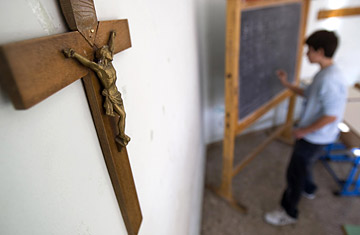
A crucifix is seen on the wall as a student writes on a blackboard in a classroom in Rome
Europe's increasingly muscular brand of secularism has an unofficial capital: Strasbourg, France. Over the past decade, the quaint city of 273,000 near the German border — home to the European Parliament and other key international bodies — has been the site of a series of repeated slap-downs to those who are fighting to hold on to the Old Continent's fading religious impulses.
The latest religious vestige to be targeted is the crucifix that still hangs on the walls of many Italian public schools, a fixture the Strasbourg-based European Court of Human Rights has now ruled is a violation of religious and education freedom. The Italian government announced it would appeal the Nov. 3 decision that would force Italy to pay a €5,000 ($7,400) fine to a mother in northern Italy who fought for eight years to have the crucifixes removed from her children's classrooms. Though the European court's decision does not call for the immediate removal of all the Italian crucifixes, it could eventually force a Continent-wide review of the use of religious symbols in all state-run schools.
The presence of this Christian symbol in public schools (it's also on display in some Italian courtrooms) might be jarring to those in the U.S. and U.K. — even to the religiously inclined — where separation of church and state is drawn with clear lines. But while faith is fading in Italy as it is across Europe, the crucifix is widely accepted by Italians as a cultural as well as religious symbol. The decision in Strasbourg was swiftly condemned by most of Italy's political establishment, from the divorced and famously loose-living Prime Minister Silvio Berlusconi to the center-left leader and onetime Communist Party member Pier Luigi Bersani, who called the ruling an example of "good sense as victim of legalities."
The Vatican, whose influence in Italy has helped maintain a role for Catholicism in public schools, including hiring church-approved teachers for religion hour, lashed out at what it called the latest "ideological" ruling from Strasbourg. "The court wanted to ignore the role of Christianity in forming Europe's identity, which was and remains essential," Vatican spokesman Father Federico Lombardi said in a statement on Nov. 3. "Religion gives a precious contribution to the formation and moral growth of people, and it's an essential component in our civilization. It's wrong and myopic to try to exclude it from education."
The reality, however, is that Pope Benedict XVI and other religious leaders in Europe are swimming against a growing secular tide. A 2008 Gallup poll registered a continued decline in Christian faith across Europe. More than two-thirds of respondents in countries such as Britain, France, the Czech Republic and all of Scandinavia responded "No" to the question of whether religion was important to them. The 82-year-old Benedict has made it a centerpiece of his papacy to reverse the decline of Christianity on the Continent, where the faith originated. Last month, he used a Vatican meeting with the new E.U. envoy to the Holy See to recall the church's lingering bitterness over the failure of the European Parliament to include a reference to the "Christian roots" of Europe in the E.U. constitution a few years back. In 2004, a committee of the same parliament was also responsible for torpedoing the nomination for European commissioner of Rocco Buttiglione, a prominent Italian politician known for his traditional Catholic views and friendship with Pope John Paul II.
The recurring flare-ups between Italy and Strasbourg are both anomalous to and emblematic of the continental shift in faith. The Vatican's presence within its borders keeps Catholicism a part of the public life and social fabric in Italy, where only 23% of respondents answered "No" to the Gallup poll question. But the largely rhetorical battles like the one over crucifixes mask the reality that Italian life is ever more secular, and the ethnic and religious fabric is in fact undergoing major changes with the arrival of immigrants, including many from Muslim-majority countries. Buttiglione, who called the court's decision this week "abhorrent," referred to the role of immigrants in Italy today, apparently also to the plaintiff in the crucifix case, a Finnish-born mother of two married to an Italian native. "Italy has its culture, its traditions and its history," said Buttiglione. "Those who come among us must understand and accept this culture and this history."
Still, the Strasbourg court cannot be accused of discriminating against Christianity in particular. In 2005, the human-rights court upheld a then long-standing ban on headscarves in public buildings in Turkey, a law that has since been eased by the current ruling Muslim party. And of course, beyond the halls of its European institutions, the city of Strasbourg is also in the heart of the ever more secularized French Republic, where students are forbidden from wearing headscarves or any other religious symbol in public schools. To U.S. and U.K. sensibilities, this ban continues to seem as strange as crucifixes on the walls.
